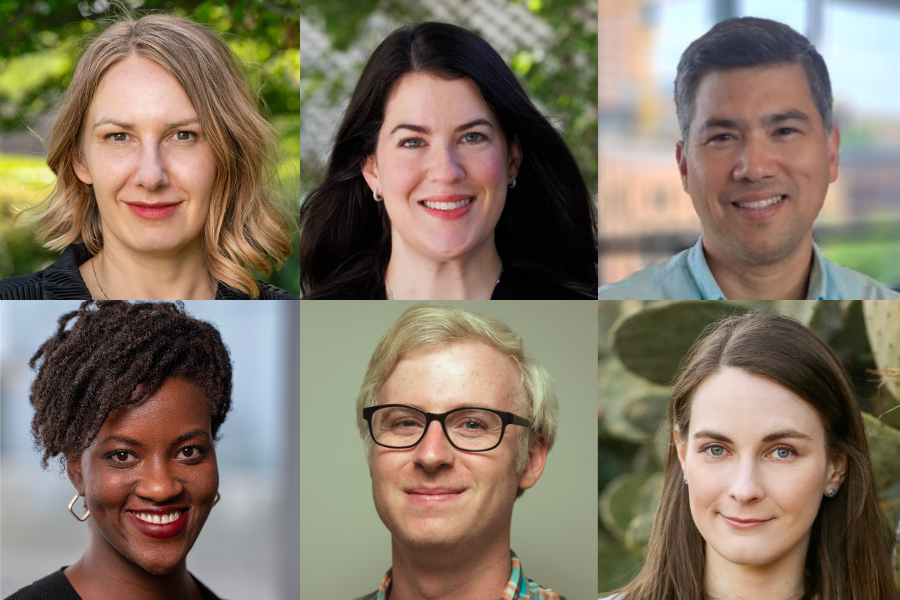Fourteen New Experts Join IPR to Strengthen Policy Innovation
Faculty explore critical topics including artificial intelligence, teen brain development, inequality, and gender dynamics
Get all our news
Our newest fellows and associates bring a fantastic mix of expertise and interests to IPR. For instance, while most of them study discrimination, they’re each doing it from their own unique perspective, with different approaches and methods.”
Andrew Papachristos
IPR Director

IPR's new fellows (from top left, clockwise): Jessica Hullman, Katie Insel, Michael Kraus, Kate Weisshaar, Rob Voigt, and Ivy Onyeador.
This fall, the Institute for Policy Research (IPR) welcomed 14 faculty—six fellows and eight associates—making it our largest incoming cohort since 2016.
Tackling issues from artificial intelligence and teen brain development to workplace equity and racial disparities in language use, IPR’s newest faculty members add their research expertise to the more than 170 faculty from 30 disciplines currently providing data-driven insights vital for evidence-based policymaking. The new faculty hail from Northwestern’s Kellogg School of Management, the McCormick School of Engineering, the School of Education and Social Policy (SESP), and the Weinberg College of Arts and Sciences.
“Our newest fellows and associates bring a fantastic mix of expertise and interests to IPR,” said IPR Director and sociologist Andrew Papachristos. “For instance, while most of them study discrimination, they’re each doing it from their own unique perspective, with different approaches and methods.”
IPR also continues to invest in its greatest resource, its faculty, through new initiatives like Morton O. Schapiro (MOS) IPR Fellowships. Two new MOS fellows were appointed this fall—anthropologist Sera Young and social psychologist Michael Kraus. These positions have been generously funded by an anonymous donor in honor of Morton O. Schapiro, an IPR economist who served as Northwestern’s president from 2009–22.
All of these new experts strengthen IPR’s unique approach to policy research—one that emphasizes tackling society’s most pressing issues from a variety of perspectives. By bringing together scholars from different disciplines, IPR ensures that critical challenges, like those faced by American families and policymakers, are analyzed through multiple lenses.
“Policy is everywhere and touches everything we do, and our faculty are diving deep into how these dynamics play out in various spaces,” Papachristos said.
Introducing IPR’s New Fellows for 2024–25
Jessica Hullman | Katie Insel | Michael Kraus | Ivy Onyeador | Rob Voigt | Kate Weisshaar
Using Data Science to Help People Make Better Decisions: Jessica Hullman
Jessica Hullman, the Ginni Rometty Professor of Computer Science, creates tools and methods to help people make better decisions by combining their knowledge with statistical models. She also studies how to make data visualizations and interactive tools that align with how people think, applying her work to areas like data privacy and network analysis.
Drawing on statistical decision theory and other formal methods, she is developing new ways to measure how much people should rely on AI as well as new ways to align prediction uncertainty with human needs. Her ultimate goal with this work is to improve collaboration between human and machines.
Hullman has been recognized for her contributions with several awards and was named a Microsoft Faculty Fellow in 2019. Her research is supported by organizations like the National Science Foundation, Adobe, Google, and the U.S. Navy. Hullman earned her PhD in Information Science from the University of Michigan in 2014.
Exploring How Kids’ and Teens’ Brains Develop: Katie Insel
Neuroscientist Katie Insel studies how the brains of children and adolescents develop. Her research looks at how kids and teens build important mental skills to handle daily challenges. She also explores how brain development relates to mental health disorders, which peak during the adolescent years.
To study these topics, she leads a lab that uses a mix of tools like brain scans, computer tasks, and mathematical models. Insel is dedicated to making her research useful for real-world applications, and she has built partnerships with policymakers, educators, and clinicians.
Currently, Insel is exploring how rewards and punishments influence decision making, learning, and memory as children grow into adults. Her research also examines how changes in brain connectivity shape motivation and self-control. Insel hopes to uncover the links between brain development and wellbeing, aiming to identify patterns that could predict risks for mental health disorders.
Her research has been funded by the National Science Foundation and the National Institutes of Health. Insel earned her PhD in Psychology from Harvard University in 2019.
Examining How We Make Sense of Inequality: Michael Kraus
Michael Kraus, a Schapiro Faculty Fellow, is a leading expert in the social psychology of inequality. His work focuses on how emotions, motivations, and relationships perpetuate social hierarchies. Through experiments, surveys, and observations, he studies how people perceive inequality and the impact this has on their behavior, relationships, and policy.
Kraus’ current research includes studies of how providing information can change people's views on reparations and the wealth gap between Black and White Americans. His findings show how educational messages can be crafted to reshape attitudes toward racial inequality and economic justice.
He is a fellow of the Society for Experimental Social Psychology, the Association for Psychological Science (APS), and the Society for Personality and Social Psychology (SPSP). His many accolades include the APS Rising Stars program, the SPSP Sage Young Scholars Award, and an award for outstanding mentorship in the social sciences from Yale University. Kraus earned his PhD in social psychology from the University of California, Berkeley, in 2010. He has held academic appointments at Yale University and the University of Illinois, Urbana-Champaign, and served as a visiting scholar at the Russell Sage Foundation.
Investigating Racial Interactions and Promoting Understanding: Ivuoma (Ivy) Onyeador
Ivy Onyeador is a social psychologist who researches how to reduce bias and discrimination, particularly in organizations. She focuses on evaluating different strategies to improve people’s ability to perceive inequality and their motivation to address it.
Her current projects explore how positive interactions between different racial groups can decrease prejudice and how diversity policies within organizations influence employees’ experiences and attitudes. Onyeador strives to provide insights that can help make schools, workplaces, and communities more inclusive and equitable environments.
Onyeador’s research has received support from prestigious funders like the National Science Foundation and has been published both in top journals and popular outlets such as the New York Times and the Atlantic. She has been named a “Rising Star” by the Association for Psychological Science and received the SAGE Early Career Trajectory Award. In 2022, she was listed among Poets & Quants’ best 40 under 40 MBA professors. For the 2024–25 academic year, she will be on leave at Harvard Business School. Onyeador received her PhD in psychology from University of California, Los Angeles in 2017.
Uncovering What Language Can Reveal About Biases: Rob Voigt
Rob Voigt uses his training as a linguist to explore how language influences social interactions and reflects social attitudes, with a special focus on race and identity. His research uses advanced computational methods to analyze large datasets to uncover how subtle language patterns can reveal and perpetuate biases, and to ultimately inform interventions and policy to mitigate them.
Voigt’s work covers a wide range of issues, including racial disparities in police language, media representations of social groups, and the role of nonverbal communication in social interactions.
His current projects include collaborations with fellow IPR faculty to better understand potential bias and disciplinary differences in letters of recommendation as well as language differences in mental health conditions like autism and psychosis. In new work with collaborators at the University of Chicago he is also analyzing 911 calls to understand the role of language in racial disparities in emergency response.
Voigt’s research has been published in leading interdisciplinary journals such as the Proceedings of the National Academy of Sciences and Sociological Science. Notably, his work on analyzing police language from body camera footage earned him the prestigious Cozzarelli Prize in 2017. He completed his PhD in Linguistics at Stanford University in 2019.
Analyzing Gender, Work, and Family Dynamics: Katherine (Kate) Weisshaar
Sociologist Kate Weisshaar examines inequality in the workplace, focusing on how social policies and gender dynamics shape people’s career opportunities and outcomes. She seeks to understand the challenges faced by women, parents, and underrepresented groups in the workforce.
Weisshaar's current research focuses on discrimination in hiring, workplace meetings, and pay within organizations. She investigates how discrimination varies by job level, applicant characteristics, and labor market contexts, taking an intersectional approach. She also explores how work meetings contribute to inequality and the narratives organizations use to address or perpetuate the gender wage gap.
Her findings have been published in esteemed journals such as American Sociological Review, Social Forces, and Demography, and her research has been supported by the National Science Foundation and the Russell Sage Foundation. Weisshaar received the Rosabeth Moss Kanter Award for Excellence in Work-Family Research for her article “From Opt Out to Blocked Out: The Challenges for Labor Market Re-entry After Family-Related Employment Lapses.” Weisshaar earned her PhD in Sociology from Stanford University in 2016 and comes to Northwestern from University of North Carolina-Chapel Hill, where she was an associate professor of sociology.
Introducing IPR’s New Associates for 2024-25
Additionally, IPR welcomed eight new faculty associates this fall. Their expertise covers a broad array of policy-relevant topics from terrorist attack forecasting and economic inequality to public discourse analysis and educational equity.
Kristian Hammond is the Bill and Cathy Osborn Professor of Computer Science in McCormick. His expertise covers a wide variety of fields related to computer science, AI, and the future of work. He co-founded Narrative Science, a startup that uses AI and journalism to turn information from raw data into natural language.
David Morton is the Walter P. Murphy Professor of Industrial Engineering and Management Sciences in McCormick. His research explores stochastic optimization and its application to public health, energy, and security, including disaster responses, forecasting and modeling for disease outbreaks, and optimizing operations and costs for solar power.
Martin Naunov, a College Fellow in Weinberg, is a scholar of political behavior and psychology. He considers questions of stereotyping, discrimination, and intergroup relations and is particularly interested in using vocal experimental stimuli and audio data to study these issues.
Hatim Rahman, associate professor of management and organizations in Kellogg, investigates how artificial intelligence, undergirded by algorithms, can affect employment and labor markets. His 2024 book Inside the Invisible Cage traces how organizations use algorithms to control workers.
Doron Shiffer-Sebba is an assistant professor of sociology in Weinberg. His research delves into the intersection of extended families and wealth inequality. To better understand the persistence of inequality over time and across generations, he deploys a wide array of methodological tools—ethnographic, quantitative, and computational.
Oscar Stuhler, an assistant professor of sociology in Weinberg, analyzes public discourse using formal, quantitative methods. He also works to develop methods and theory that allow him to better understand textual representations of social structures.
V.S. Subrahmanian, the Walter P. Murphy Professor of Computer Science, leads the Northwestern Security & AI Lab. He uses machine learning to analyze text, geospatial, relational, and social network data. His models have been used to forecast terror attacks, deter intellectual property theft, identify bad actors on social media, and more.
Sepehr Vakil, associate professor of learning sciences in SESP, studies STEM education, technology ethics and policy, educational equity, and cultural processes in learning, among others. He directs the Technology, Race, Ethics, and Education (TREE) Lab, and is Senior Adviser on AI to the Spencer Foundation. He also writes a newsletter and co-hosts a podcast.
Published: September 27, 2024.


